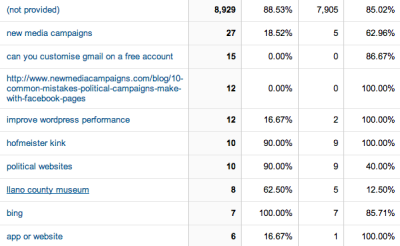Keyword Data: "Not Provided" - What it Means for your Site's Analytics and SEO
When you wake up from your post-Halloween candy coma this morning and log in to review your site’s usage analytics for the month of October, you’re bound to notice a big change in the Keyword Data for organic searches. The change is.. it won’t be there.
Google announced at the end of September that it was no longer providing information to Google Analytics users about the keywords driving organic traffic to their websites. Starting in October, all Google searches have been securely encrypted, and site owners can no longer see exactly which words people used when searching Google to find their sites. Instead, these organic search visits will be tracked as “not provided."

Sounds like all trick and no treat from Google, huh? Analytics users may find this update alarming and pretty hairy (though those people probably have not seen Alex Pomer in a Chewbacca body suit.) But with a little background information and some tips for moving forward, you can continue to succeed in SEO in the world of “Not Provided.”
Why now?
While this may seem a little out-of-the-blue, the percentage of reportable keyword data has been steadily declining for all websites for over two years. If you review your site's analytics regularly, you've probably noticed this change. In 2011, Google announced it would be providing SSL encryption for search data for all signed-in search users to any Google product (Gmail, Google+, Youtube, etc.) This most recent change just extends that to users who are not signed in to a Google account, i.e. everyone.
Google says the reason for the switch is to provide additional privacy and security for its users, which is an industry-wide trend. Search Engine Land also suspects that Google may be attempting to stop NSA spying activity (or at least alleviate public concerns that it gave the NSA access to search data.) And, because keyword data for paid search ad clicks will still be available, it’s also reasonable to assume this is an effort to get more people using Google AdWords.
How can I succeed in SEO without Keyword Data?
-
Utilize Google Webmaster Tools. If you haven’t done so already, connect your Google Analytics account with a free Google Webmaster Tools account. Webmaster Tools will have a similar, although incomplete, set of keyword data for your site for you to review. The most significant difference is that Webmaster Tools is based on a sampling of aggregated traffic, rather than the full set of terms. But, this can still give you a general idea of the keywords driving traffic to your site. (If you're unfamiliar with GWT, definitely check it out. In addition to keyword data, there are a myriad other valuable SEO tools at your disposal.)
-
Research, Research, Research. Keyword research is one of the most important and valuable practices in search marketing. Even in the world of "Not Provided," you can still effectively determine the ‘right’ keywords to target throughout your site's content. Use free tools like Google AdWords Keyword Planner and Wordtracker’s Free Basic Keyword Demand as the foundation of your keyword research. The Moz Blog category on Keyword Research is also a great place to start. That missing keyword data was just one piece of the keyword research puzzle, and with the right approach, you can be just as successful at keyword research without it.
-
Update your performance metrics. Because this data has been disappearing over the last few years, many Google Analytics users no longer rely on this information to measure their site's search engine performance. However, it's useful to replace this missing data with metrics we can see. For example, one of the most critical pieces of information lost in this update is the ability to differentiate between branded and non-branded search terms. (For NMC, a branded search phrase would be 'new media campaigns,' vs. the non-branded phrase 'web design agency.') In the old days, Google Analytics users benchmarked search engine performance on the ratio of branded to non-branded keywords driving users to a site.
How do we make up for that lost information? Well, we can still see the total number of organic searches, which is valuable in and of itself. Track what percentage of your total traffic is coming from organic searches each month as a measure of search engine performance. You can also take a look at the entrance page URLs for organic searches and ‘work backwards’ to figure out what kinds of searches drove visitors to these pages. - SEO hasn’t changed. Google's algorithm updates are meant to reward websites that produce relevant content and get nods of approval (links) from other authoritative sites. That's not likely to change anytime soon. This 4-year-old NMC blog post on the Basics of Search Engine Optimization is still 100% relevant today, and that speaks volumes. At the end of the day, Google wants users to have a good experience by returning quality, relevant websites on its search engine results pages. If you're consistently creating compelling content, getting linked to and optimizing the pages on your site for relevant keywords, you will continue to rank organically for your targeted terms, with or without the Google Analytics keyword data to back it up.





Comments
Andrew
Claire, we've been working on keyseo.io which utilizes 1. and does 2. for you. As for 3. organic and paid keywords and also traffic from other sources like social and email are good metrics to incorporate.Fred
Thanks for these tips. The problem I see with analysing our keywords in GWT is that we cannot know with ones convert the best... but sure it gives us an idea of the keywords that drove traffic on our website.Another tip is the analyse of our entry pages, I use it mostly. And on this topic I recommend an article that gives web analytics methods: http://blog.atinternet.com/en/index.php/2013/07/23/best-practices/how-to-improve-seo-despite-an-increase-in-the-number-of-not-provided-keywords-web-analytics-methods-and-useful-tips/1432, it may interest your readers.
Leave a comment